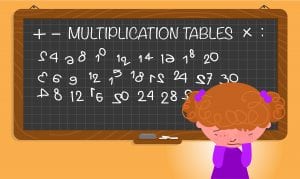Dyscalculia: Learning Disability in Math
Written by: Rebecca L. Marshall, Ph.D.

Parents of children struggling with math in school may wonder whether their child has a learning disability. Dyscalculia is the name of the learning disorder specifically associated with difficulty grasping basic math concepts. The difficulty is diagnosed as a learning disability when the child’s struggle cannot be explained by inadequate instruction or low intellectual ability. Approximately 5% of children in elementary school struggle with dyscalculia.1
There are multiple cognitive skills that are critical for mathematical reasoning. These include visual-spatial manipulation of information, executive function skills of sequencing, working memory, and inferential reasoning, and short- and long-term memory skills. A child struggling with dyscalculia may have difficulty in one or more of these areas of cognitive skill development.
Psycho-educational testing is important for differential diagnosis of cognitive and academic difficulties, as well as for the development of a treatment plan to help a child succeed in school. Understanding a child’s cognitive profile is essential for determining the best methods for intervention when he or she is struggling with math.
Children who are performing poorly in school will often be formally evaluated for academic interventions at school. However, some students are not identified as needing additional help or assessment at school if they are managing to achieve passing grades, even while struggling with a developmental math disorder. Typically these students who are not identified early will begin to struggle significantly as they advance academically and need to keep up with an increased academic load. Early diagnosis is therefore important for helping children with difficulties in math succeed long-term.
Children and adolescents with significant attention problems, including Attention-Deficit/Hyperactivity Disorder (ADHD), often show variability in math skills, as do children with developmental reading problems such as dyslexia. There is a relatively high incidence of ADHD and dyslexia in children diagnosed with dyscalculia.1 Formal assessment of a child’s difficulties is therefore important for determining how teachers and parents should intervene to help an individual student succeed.
Emotional health can have a significant effect on a child’s academic performance. Evaluations of learning difficulties should include an assessment of emotional factors that may affect a child’s behavior and achievement in school. At the Summit Counseling Center, we provide screening assessments for attention, academic, and emotional problems, as well as comprehensive evaluations for specific learning disabilities. Through these psycho-educational evaluations, we identify how students may achieve their full potential. Please contact psychologist Rebecca L. Marshall, Ph.D., at the Summit Counseling Center (678-893-5300) for more information.
1 Kaufmann, L., and von Aster, M. (2012). The Diagnosis and Management of Dyscalculia. Dtsch Arztebl Int., 109: 767-778.
